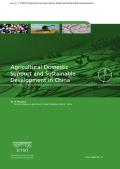
This paper offers an initial assessment of the use, potential usefulness and legality of local content requirements (LCRs) in renewable energy policy. By scrutinising existing empirical evidence on LCRs, the authors identify a number of initial basic conditions that determine the effectiveness of such measures in creating domestic industries. The paper provides an in depth analysis of the wind LCR in China, and descriptive analyses of other LCRs used in the promotion of renewable energy around the world. It further qualitatively addresses the question whether or not local content requirements and medium-term innovation could be aligned. Finally, it discusses the legality of the measures under WTO law.
Other case studies include Canada, Spain, Italy, France, Greece, Croatia, the United States, India, Brazil, South Africa and Turkey.

Developing countries are faced with the dual challenge of reducing poverty while improving management of natural capital and mitigating the emission of greenhouse gases (GHG) and local pollutants. The challenge is particularly acute for large, rapidly growing economies, such as India, China and Brazil. In 2007 the Energy Sector Management Program (ESMAP) and the World Bank began to provide support to countries to develop long-term frameworks for reducing GHG emissions in a way that is compatible with economic growth objectives. This report presents lessons learned from seven country studies. These include: countries must take the leading role; adopt a flexible approach and build a multi-disciplinary team; stakeholder engagement and consensus building is essential; allow sufficient time and resources; and invest in data and tools. The report is intended as a practical guide for government officials, practitioners and development agencies involved in low carbon development planning.
This summary was prepared by Eldis.
This International Institute for Sustainable Development and the Finance Research Institute of the Development Research Centre, State Council of China, are collaborating on an exploration of policy options to support China in developing a “green financial system,” and to encourage such developments internationally. This paper highlights the findings from the first phase of this partnership.
China and India are heavily dependent on high-carbon fossil fuels. This article elaborates the implications of low-carbon energy transitions in the two countries, which can mitigate their serious contribution to climate change while allowing economic growth. Three modelling case studies are presented: for the Chinese power sector, the economy of Beijing and rural Indian households without access to electricity. They demonstrate a significant reduction in greenhouse gas emissions and energy use, while costs are likely to increase. Financial assistance and technology transfer will be needed to support their efforts towards a climate-friendly lowcarbon economy.
This summary was prepared by Eldis.
